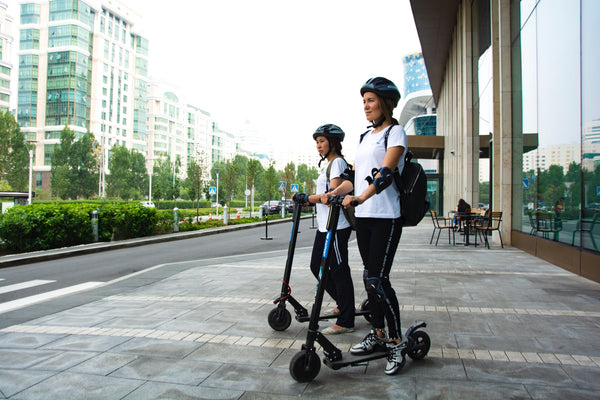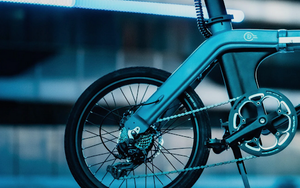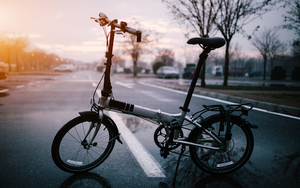Clarifying Electric Scooter Legality in the UK
Oct 21, 2022
There has been a lot of contention over the legality of using personal electric scooters in public places in the UK. Despite them being illegal (currently), you can still see them everywhere on the roads – step out your door in any city and people from all walks of life are using one. They’re also legal and widespread all over Europe, yet not here?
To add to that, you may have recently heard that there has been a positive announcement from the government regarding personal e-scooter legality.
Cue the confusion…
So, what’s the answer? Are they legal now? Is it still a grey area? We know it’s all a bit unclear – but don’t worry, we’ve got you covered.
By the end of this blog, you’ll have a good understanding on the current legal situation and learn more about the benefits of electric micro-mobility.
Are personal use electric scooters legal in the UK?
In short, not yet .
Well, are they going to be made legal?
Yes.
The government recently announced their plans for legalisation in May, finally! You can stay updated on the government's intentions to legalise private e-scooters by visiting the official announcement on the Road Safety GB website.
When will they introduce this legislation?
That’s yet to be confirmed, but we expect it to be within the next six months.
Now for the real question:
If I ride my e-scooter on public roads NOW, will I get stopped by the police?
Technically, you could, but we think that’s unlikely, here’s why:
-
As mentioned before, e-scooters are everywhere. If people got stopped frequently by the police, would everyone still be riding them? We don’t think so.
-
Personally, I ride my e-scooter past a police station and police cars in London every day, yet I have never had an issue.
-
Before the plans for legalisation were announced by the government, it was rare that you would get stopped on an e-scooter anyway. Now that their legalisation has been announced, it seems police are a bit more lenient and more than happy to turn a blind eye until they’re formally legal.
So, although not a definitive answer, it’ll help you make your own informed decision on how to proceed. If you’re desperate for a micro electric form of transport, but aren’t quite ready to get an e-scooter because of the grey area in the law, an e-bike is an incredible alternative.
Why are personal use e-scooters illegal in the first place?
Contrary to popular belief, it’s nothing to do with the safety of e-scooters. They are perfectly safe.
Believe it or not… It’s down to a 183-year-old law.
Personal use electric scooters are classed by the Department for Transport as ‘Personal Light Electric Vehicles (PLEV)’ because they are powered by a motor. This means they can only be used on private property, similarly to electric skateboards, hoverboards and twist throttle e-bikes (not to be confused with pedal-assisted electric bikes, which are perfectly legal if they are limited at 15.5mph).
Due to this ancient law classifying e-scooters, you can’t ride them on the road because the DVLA requires electric vehicles to be registered and taxed. As e-scooters are a relatively new technology, they have not yet been classified in the correct category to make them legal to ride in public.
The UK government is way behind the times. If you’ve recently travelled abroad you’ll know this. E-scooters are perfectly legal in many countries around the world, with many more continuing to recognise them as a new convenient way to commute.
Why we want the UK to hurry up, and why you should too.
We want the lovely people of the UK to be using electric micro-mobility as much as possible and as quickly as possible.
Why? For a number of reasons:
City pollution is no joke, did you know:
-
Annually, 9,400 premature deaths in London are attributed to poor air quality - shocking, right?
-
And this may come as a surprise – electric vehicles are not the golden alternative. Yes, they are better for reducing greenhouse gases such as carbon dioxide, but they still emit harmful particulates. Here’s why – electric vehicles are much heavier than traditional combustion vehicles (because of their batteries), and that means the particulates released from the tyres and brakes are greater. That’s the bad stuff we inhale.
Climate change is no joke, did you know:
-
Transport contributes to nearly 30% of global greenhouse gas emissions with UK emissions per capita amounting to ~ 5.5 tonnes-of-CO2-equivelant
-
That’s the harmful stuff that causes climate change. We need to slash these numbers rapidly if we have any chance of limiting the environmental effects and preserving our planet.
Electric micro-mobility decongests roads, which in turn:
-
Contributes to less vehicles idling in busy areas and at traffic lights, which reduces emissions and the effects of climate change and air pollution even further. It’s a positive feedback loop.
-
Makes it less likely to have accidents with large motor vehicles, meaning our roads are safer
With conventional modes of transport being so harmful to us and our planet, it’s undoubtable that we need to revolutionise how we choose to get around. At E-Dash, we know that e-bikes and e-scooters are the solution. They are convenient, cheap, good for the environment and good for the health of their users.
We believe that the cities of the future will be clever in not even allowing us to drive our polluting cars anywhere near the centres. It’s already happening in London, and many more cities are following suit (find out which 11 cities are introducing new low emissions zones in 2022). Oxford are going a step further and introducing a ZERO EMISSIONS ZONE. Good move, Oxford.
It’s the right thing to do. It’s for the health of our country.
Think of it: rather than popping to the shops in your two-tonne polluting SUV for a 5-minute journey, take your e-scooter, or your e-bike.
Get some fresh air. Exercise. Release endorphins.






